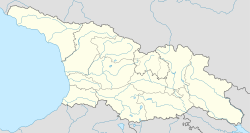Leselidze (town)
|
Leselidze ლესელიძე (Georgian) Гьачрыҧшь (Abkhaz) Gyachrypsh |
|
|---|---|
| Town (and municipality) | |
 |
|
| Location in Georgia | |
| Coordinates: 43°23′N 40°01′E / 43.383°N 40.017°ECoordinates: 43°23′N 40°01′E / 43.383°N 40.017°E | |
| Country |
|
| De facto state | Abkhazia |
| District | Gagra |
| Government | |
| • Mayor | Roman Rabaia |
| • Deputy Mayor | Roman Kharabua |
| Time zone | MSK (UTC+3) |
Leselidze (Georgian: ლესელიძე, Leselidze; Abkhaz: Гьачрыҧшь, G'achryphsh; Russian: Леселидзе, Гечрипш) is a town in Abkhazia. Formerly named Yermolovsk, the town is located on the shores of the Black Sea and is 14 kilometers from the city of Gagra.
The town was founded in the 19th century as the settlement Yermolovsk (Russian: Ермоловск), named in honor of the Minister of Agriculture A.S. Yermolov who traveled to this place in 1894. Some authors linked the name of the settlement to General Yermolov (commander of the Caucasian war), but this presumption is apparently erroneous.
In 1944 the town was officially renamed in honor of the national hero Colonel-General Konstantin Leselidze (1903-1944) who fought in the Caucasus during the World War II. In the post-war years the town saw a lot of improvements, it was developed as a vacation site. A children's sanatorium was built as well as a resort and a sports training base. The base was favored by top Soviet athletes. Soviet Union national football (soccer) team and other Soviet football clubs trained there as well as handball players and track-and-field athletes.
In 1975 a monument (created by Silovan Kakabadze) of Konstantin Leselidze was erected in the town. In September 1992, after the fall of Gagra during the 1992–1993 war in Abkhazia, Abkhazian troops destroyed the monument along with other Georgian landmarks.
In 1992, the town was renamed Gyachrypsh by the unregocnized Abkhazian authorities. The name “Gyachrypsh” originated from the territory which was ruled by the Abkhazian prince named Gech or Gechkuaj. In historical literature there is a variation: “Gechiler” ( Circassian “Gech-chiler”).
...
Wikipedia

